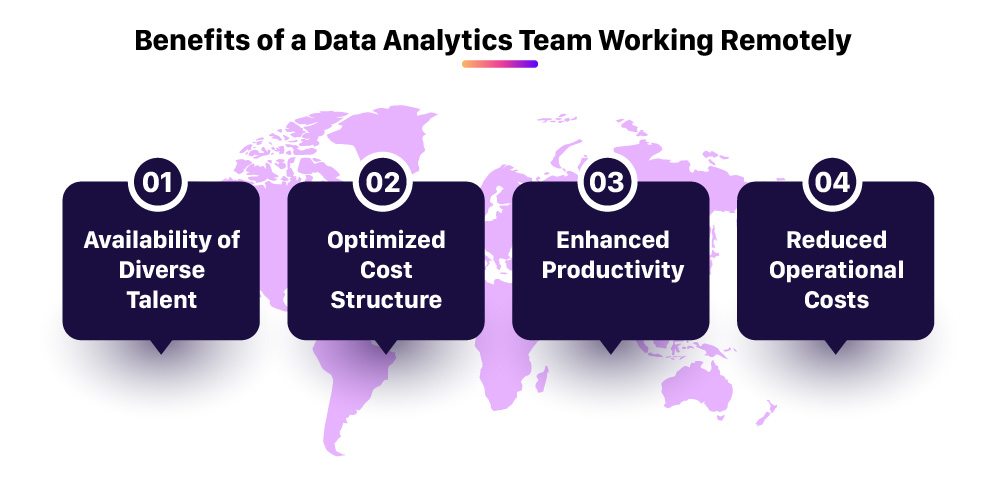In this digital world, having a data analytics team has become a necessity for every organization as these teams provide insight for better decision-making. The data analytics teams provide data-driven decisions using statistics regarding customer behaviors, market trends, and competitor insights and have proved to be an integral part of the industry.
Given the fact that the nature of a data analytics role is data collection, data cleaning, and critical data interpretation, having the team in the home country or in close proximity to the business is not a mandate.
In fact, a remote data analytics team broadens the horizons of onboarding talent beyond geographical constraints with a flexible budget. It is needless to mention global digitization has completely transformed the concept of remote teams in recent years.
Our aim in writing this blog is to help our readers explore the possibility of reducing costs by building a remote team of data analysts and at the same time improve the efficiency and effectiveness of the data analysis function by reaching out to the best resources in the field.
How Does a Remote Setup Work Better for a Data Analytics Team?
The remote data analytics teams in multiple organizations have proven to be more productive and successful with enhanced quality of work. It is important to understand how these organizations are reaping the benefits by building remote data analytics teams. Data analysts on a day-to-day basis deal with complex and sensitive data models, dashboards and reports, vast computational statistics, and collaborative coding. High-end tools and technologies are the secret sauces to successfully facilitate and track these processes remotely.
Platforms like Apache Nifi and Talend are used as ETL (Extract, Transform, Load) tools to integrate big data from a variety of sources and channels. Next comes MySQL, PostgreSQL, Amazon Redshift, and Google BigQuery responsible for querying, analyzing, and storage of large amounts of datasets. Further, data analytics teams get their hands dirty with programming languages like R and Python and interactive platforms like Power BI and Tableau to formulate and visualize complex data and convert them into creative and easy-to-understand presentations, documents, and spreadsheets.
Additionally, as the data analysts deal with heavy data, the storage and security infrastructure should be absolutely rigorous. This is where cloud services like Google, AWS, and Azure aid them with effective and stable data storage. Last but most importantly, collaboration among the team and proper tracking of real-time progress are the heart and soul of a data analytics team. Thus, these two heavy duties are taken care of by renowned tools in the market like Jira, Trello, Asana (project management tools), Microsoft Teams, Slack, Google Workspace, etc.
Now going by the process flow and the facilities used by an ideal data analytics team, it can be easily construed that a data analytics team can be set up remotely. It is clear that there is no prominent role for the team to be present on-site and execute their job from the office, rather data analysts can be more focused on their job while working in more comfortable locations.
Benefits of a Data Analytics Team Working Remotely
In the era of remote work, more and more employees in various sectors prefer to work from their home locations in their own comfort. However, it is a win-win situation for both the organization and the employees when it comes to data analytics teams. Let us discuss the advantages for organizations in building a team of remote data analysts.

Availability of Diverse Talent
With a remote setup, organizations are no longer restricted to hiring candidates from the local talent pools. They can organize a rigorous talent hunt and hire expert professionals from across continents. This will add heightened perspectives on the remote team from the diverse set of skills and qualities brought by all the cream candidates. Read through our blog to learn more about talent availability.
Optimized Cost Structure
With no location barrier, organizations can employ candidates from countries with lower living costs and maintain the standards of quality candidates at the same time. This way the salary brackets of employees will also be lower, thus cutting the payroll budget significantly. There are other employee-related expenses as well such as employee benefits, onboarding and training costs, etc. which can be modified and optimized distinctively for remote employees. Read through our blog to get an overview of the cost of building remote teams.
Enhanced Productivity
While working remotely, data analysts can definitely enjoy the quiet of their homes without the hustle and bustle going around in the office space. This causes much less distraction for them and helps them increase their productivity and creativity levels.
Reduced Operational Costs
Physical office setup involves miscellaneous logistical and operational expenses which include office space lease, utilities and equipment, maintenance and repairs, travel expenses of employees, added perks to employees in the office, etc. These expenses can be avoided at large while maintaining a team remotely. Organizations can also be flexible with a remote team, scaling up or down according to project needs and making significant budget cuts which is difficult to execute with office-going employees.
Concerns about Building a Data Analytics Team Remotely
Despite the fact that remote data analytics teams are among the most robust and successful working teams in the employment industry, there are still some loopholes to cover by the organizations. Let us have a close peek at them.
- Talent Onboarding: In the ocean of highly qualified data analysts and skilled candidates in the field, it gets tough sometimes in a remote setup to recognize and hire the best fit for an organization. Assessing the qualities of a candidate remotely per se is a challenging task and it only gets tougher with interviewing candidates from different cultures and locations.
- IT and Infrastructure Support: The entire functionality of a team of remote data analysts depends on proper technological support. And no matter how advanced we have got, there are always some malfunctions either with hardware or software equipment required for the job.
- Data Security and IP Protection: Data analysts deal with heavy and highly sensitive data along with massive amounts of intellectual property stored in their systems. Without tightly secured access and protection protocols, there is always a chance of data loss.
- Effective Collaboration: Data analysts require effective and fast communication among the team members to have access to real-time data and work progress. Without access to smart collaborative tools, the team will fail to get those data which can even cause a business loss in severe cases.
However, organizations from various sectors have cracked the code to shut these loopholes and run their remote data analytics teams successfully. To cite a few examples, Microsoft and Google from the IT sector, JPMorgan Chase and Goldman Sachs from the finance sector, Amazon from retail, and Pfizer from healthcare all have flourishing remote data analytics teams in their buckets.
In fact, multiple large and small organizations in India, a country highly supported by skilled youth and a perfect tropical location for businesses, have made remote data analytics teams a norm for a decade now.
How to Successfully Build a Data Analytics Team Remotely?
Organizations need robust strategies and meticulous planning to build a successful remote data analytics team without the concerns mentioned above bugging the teams constantly. One of the go-to methods organizations approach is to hire freelancers or independent contractors for specific projects. While this method is a short-term commitment and is flexible in nature, it lacks employee loyalty to the organization and the employer has little to no control over the availability and work process of the hired candidates.
Another approach followed by the organizations is to hire full-time remote employees with their in-house HR team. While this approach ensures easier team management and higher productivity levels for the employees, there are some serious concerns associated with it. Hiring a full-fledged remote team internationally within an optimized budget, getting access to the right talent in a foreign land, handling international legal and compliance factors, etc. are some of the common challenges faced by organizations planning to build an international remote team on a daily basis.
To take the edge off all these unsettling factors, a relatively new employment model has been introduced named Employer of Record (EOR). This model is in its booming period and yet has won the hearts of all those business owners who have been partnering with it to find the perfect solution to their remote team building plan. Employer of Record is a significantly economical and prudent approach to hiring and managing a remote team.
An EOR assists an organization with top-quality talent, proper IT and infrastructure support, solid data security and protection to maintain heavy data used by a data analytics team, payroll management, legal and compliance management along with ample other benefits, all while the organization has access to these facilities at a cost-effective budget and has full control over the hired remote team. We have discussed in detail how to partner with the right EOR in our recent blog.
Conclusion
We will summarize this blog with a remarkable example of a leading competitive strategy consultancy from Louisville joining hands with Remunance’s EOR employment model to effectively manage and run its remote team in India. Remunance being the local expert in the employment industry, extended their assistance to the remote team with 360-degree support in recruitment, onboarding, payroll management, compliance management, and proper IT support to each employee. Remunance’s assistance helped the remote team function hassle-free and have a smooth experience of working remotely with an EOR model.
Recent
Disclaimer
This blog is created for informational purposes. Everybody is requested to seek advice from an expert before making a decision based on the information given in the blog. Remunance disclaims any liability/loss or damage caused by using the information, directly/indirectly, given in this blog.


 Book a Demo
Book a Demo